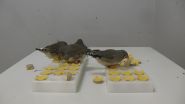(Press-News.org) The physical symptoms of weakness and fatigue from multiple sclerosis (MS) can rock a person's confidence and ability to engage in what he or she feels is important, from being a good parent and friend to taking up a hobby, according to Matthew Plow, assistant professor from Case Western Reserve University's Frances Payne Bolton School of Nursing.
To help people with MS maintain autonomy and independence, a team of researchers set out to determine what factors prevented individuals from undertaking and enjoying the activities they believe are most important to live fulfilling lives.
The study is among the first to examine what people with MS felt were important activities and what would make them happy.
Researchers asked 335 people with MS rank the importance of 20 activities. On average, the survey respondents were age 53 and lived with MS for about 15 years. Nearly 60 percent used some mobility aid.
Participants ranked the following as most important to them: Getting out and about, spending time with family and friends, managing bills and expenses, and participating in clubs and civic and political events.
The researchers sought possible new approaches to improve the health and quality of life of people with MS.
In particular, Plow said, they wanted to identify factors that rehabilitation professionals might target to increase overall engagement in community activities and promote other healthy behaviors, like exercise and eating right.
They set out to find what prevents people with MS from being engaged in social and community activities. Three barriers surfaced: lack of confidence, physical and mental impairments, and environmental factors.
Plow and his team discovered that struggling with impairments, like MS fatigue and cognitive and walking problems, interact with environmental factors, like inadequate social support and transportation issues, to impede a person's confidence to manage his or her MS symptoms in order to engage in healthy behaviors and meaningful activities, like spending time with family and friends.
A lack of confidence resulting from impairments interacting with environmental factors may impede people with MS from taking steps to prevent secondary symptoms like depression, deconditioning from lack of exercise, and poor nutrition or eating choices that may result in obesity or diabetes.
Based on the survey, Plow is testing an intervention that builds confidence in people with MS. It gives the individual steps to take to make changes and learn new skills to engage in activities that are meaningful to the participant.
INFORMATION:
The National Multiple Sclerosis Society and National Institute of Nursing Research of the National Institutes of Health supported the study.
Marcia Finlayson, PhD, OT reg, OTR, Queen's University (Ontario, Canada); Douglas Gunzler, PhD, Case Western Reserve University School of Medicine; and Allen W. Heinemann, PhD, Northwestern University and the Rehabilitation Institute of Chicago, contributed to the study.
The findings were reported in the Journal of Rehabilitation Medicine article, "Correlates of Participation in Meaningful Activities Among People with Multiple Sclerosis."
Researchers at the University of Birmingham have made a breakthrough in understanding how mutated genes in leukaemia reprogram blood stem cells and send them spiralling out of control.
The findings help to explain the early development of leukaemia, representing the essential first step to developing new treatments for patients based on these findings.
A study, published in Cell Reports by Professors Peter Cockerill and Constanze Bonifer, investigated the role of one specific mutation in the FLT3 gene found in acute myeloid leukaemia (AML).
AML is diagnosed in ...
Researchers add a new twist to the more than century old biological principles of Mendelian inheritance - describing a small group of cells in pregnant mothers that promote genetic fitness and multi-generational reproductive health.
Scientists at Cincinnati Children's Hospital Medical Center report their findings online July 23 in Cell. The study suggests a scientific basis for developing new therapies to promote reproductive health and prevent pregnancy complications like prematurity and stillbirth, according to Sing Sing Way, MD, PhD, senior author and pediatrician ...
When does aging really begin? Two Northwestern University scientists now have a molecular clue. In a study of the transparent roundworm C. elegans, they found that adult cells abruptly begin their downhill slide when an animal reaches reproductive maturity.
A genetic switch starts the aging process by turning off cell stress responses that protect the cell by keeping important proteins folded and functional. The switch is thrown by germline stem cells in early adulthood, after the animal starts to reproduce, ensuring its line will live on.
While the studies were conducted ...
Highly-social zebra finches learn foraging skills from their parents. However, new research has found that when juvenile finches are exposed to elevated stress hormones just after hatching, they will later switch strategies and learn only from unrelated adult birds - ignoring their parents' way of doing things and instead gaining foraging skills from the wider network of other adult finches.
Researchers say that spikes in stress during early development may act as a cue that their parents are doing something wrong, triggering the young birds to switch their social learning ...
If you find yourself downing that extra piece of chocolate fudge cake even though you're not hungry, it might be the absence of a hormone in your brain that's causing you to overeat purely for pleasure.
In a new Rutgers Robert Wood Johnson Medical School study published in Cell Reports, researchers found that when the hormone glucagon like peptide-1 (GLP-1) was reduced in the central nervous system of laboratory mice, they overate and consumed more high fat food.
"The mice in which the GLP-1 deficiency was induced ate beyond the need for calories and showed an increase ...
A new study by researchers at University of California, San Diego School of Medicine reveals a protein's critical - and previously unknown -- role in the development and progression of acute myeloid leukemia (AML), a fast-growing and extremely difficult-to-treat blood cancer.
The finding offers a novel target for better treating AML, and possibly other cancers, by cutting off the ability of tumors to access nearby cellular players that feed its growth. The study was published July 23 in Cell Stem Cell.
"The work really focuses on trying to understand the dependence ...
Alexandria, VA - EARTH Magazine takes you to Le Mans, France, to cover how the World Endurance Competition (WEC) race series is transforming automotive efficiency in both high-performance racing and the commercial automotive industries. EARTH's latest feature explores the science behind efficiency upgrades used by three major racing competitors: Porsche, Audi and Toyota.
Using physics and cutting-edge materials results in a "fascinating case study of how unbridled competition can produce unique, innovative and extraordinary solutions to engineering barriers once thought ...
CHAPEL HILL, NC (July 23, 2015) - For years, a crisis has been brewing in molecular biology. The problem is that antibodies--research tools used to identify key proteins at work in a cell--aren't always what they seem. Unreliable antibodies have led to numerous instances of false findings, failed experiments, and wasted money and samples.
Enter the Histone Antibody Specificity Database, a newly launched online portal that lets scientists find the right antibodies for their research with a much higher degree of confidence than ever before. Rather than relying on the claims ...
It's well known that being socially connected promotes a person's overall and psychological health. A new study from the University of Rochester now shows that the quantity of social interactions a person has at 20--and the quality of social relationships that person has at age 30--can benefit her well-being later in life.
People with poor social connections have been shown to be at an increased risk for early mortality. "In fact," said lead author Cheryl Carmichael, who conducted the research as a PhD candidate in psychology at the University of Rochester, "having ...
Astronomers using the Karl G. Jansky Very Large Array (VLA) have discovered jets of material ejected by still-forming young brown dwarfs. The discovery is the first direct evidence that brown dwarfs, intermediate in mass between stars and planets, are produced by a scaled-down version of the same process that produces stars.
The astronomers studied a sample of still-forming brown dwarfs in a star-forming region some 450 light-years from Earth in the constellation Taurus, and found that four of them have the type of jets emitted by more-massive stars during their formation. ...

